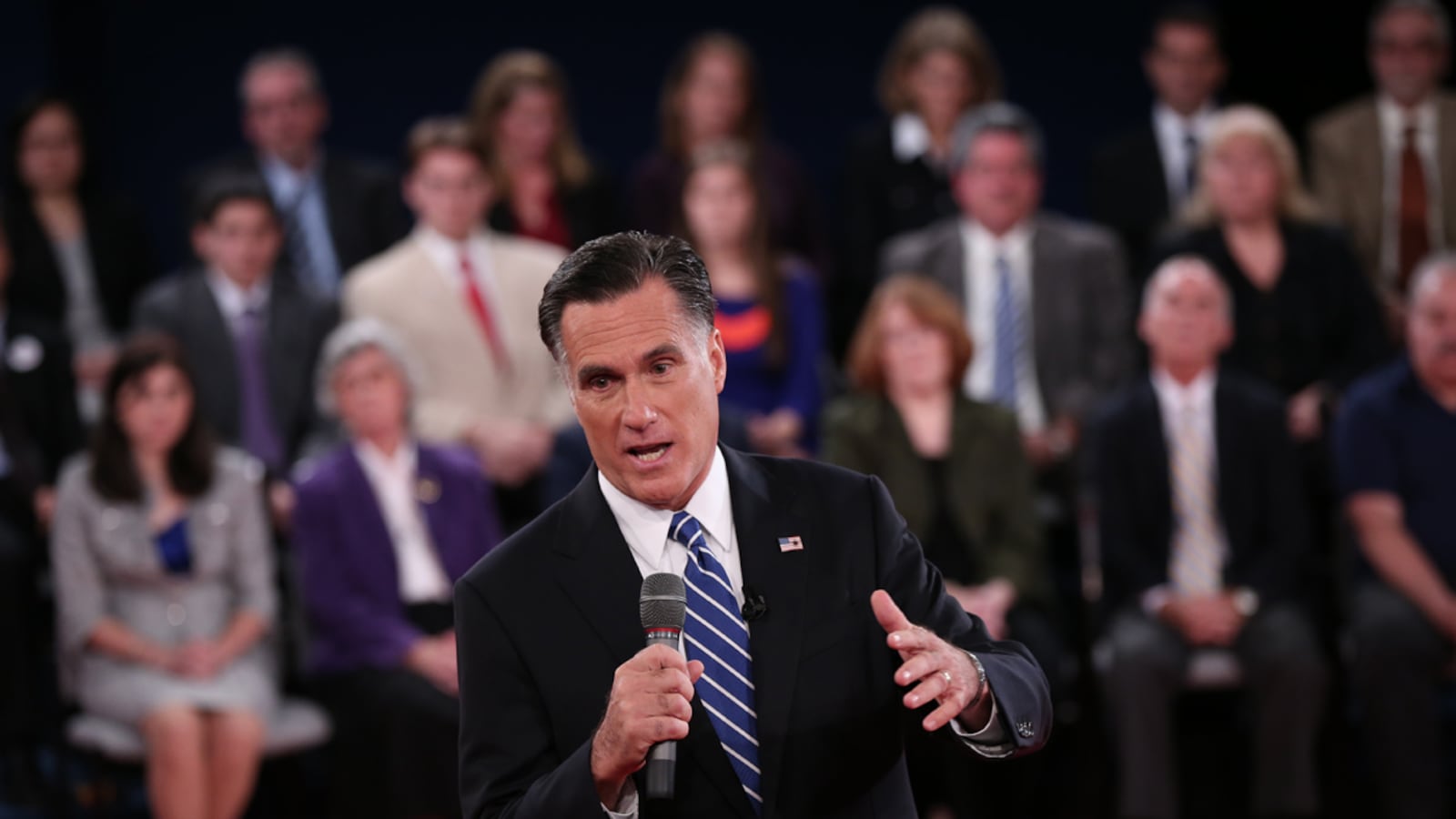The second presidential debate between President Obama and Mitt Romney, a town-hall affair at Hofstra University in Hempstead, N.Y., was a bizarre orgy of testosterone, lies, and silly anecdotes, with moderator Candy Crowley of CNN presiding over the melee like Michael Vick at a dogfight. At one point, between all the overtalking and Obama’s left-field mention of “gangbangers,” I thought I was watching Steve James’s documentary, The Interrupters.

But women’s issues, almost entirely absent from round one, finally came up. In the second question of the night, “undecided voter” Katherine Fenton asked Obama: “In what new ways do you intend to rectify the inequalities in the workplace, specifically regarding females making only 72 percent of what their male counterparts earn?”
For Romney, who has been consistently down in the polls compared with Obama when it comes to female voters, it was his chance to show 50.8 percent of the country that he cared.
Obama responded by mentioning the Lilly Ledbetter Fair Pay Act—the first piece of legislation he signed into law.
Then came Romney’s turn.
The businessman and former governor of Massachusetts said he “learned a great deal” about gender pay inequality while building his cabinet.
“And I—and I went to my staff, and I said, ‘How come all the people for these jobs are—are all men.’ They said: ‘Well, these are the people that have the qualifications.’ And I said: ‘Well, gosh, can't we—can't we find some—some women that are also qualified?’ And—and so we—we took a concerted effort to go out and find women who had backgrounds that could be qualified to become members of our cabinet. I went to a number of women's groups and said: ‘Can you help us find folks,’ and they brought us whole binders full of women.”
Binders full of women.
The comment immediately went viral, birthing a hilarious tumblr parody Twitter account @Romneys_Binder with more than 13,000 followers and counting, and a Facebook fan page dubbed “Binders Full of Women,” which had amassed nearly 200,000 likes at time of writing. The #bindersfullofwomen became a trending topic on Twitter and the phrase also was the third-fastest rising search on Google during the televised debate.
For me, the comment brought to mind Al Gore’s infamous “lockbox” comment from the debates, for which he was excoriated in numerous Saturday Night Live parody sketches, as well as the “Joy Book” from the HBO series Big Love—an actual book featured on the FLDS-focused show where pictures of frighteningly young girls who are considered marriageable are displayed. A truly awful (and admittedly tasteless) coincidence.

It’s even worse for Romney, however, when you consider that his “binders full of women” comment, arguably the debate’s most memorable line, reportedly is a lie.
According to political writer David S. Bernstein of the Boston Phoenix:
“What actually happened was that in 2002—prior to the election, not even knowing yet whether it would be a Republican or Democratic administration—a bipartisan group of women in Massachusetts formed MassGAP to address the problem of few women in senior leadership positions in state government. There were more than 40 organizations involved with the Massachusetts Women's Political Caucus (also bipartisan) as the lead sponsor.
“They did the research and put together the binder full of women qualified for all the different cabinet positions, agency heads, and authorities and commissions. They presented this binder to Governor Romney when he was elected.”
Now, Romney did, according to Bernstein—who cited information from MassGAP and MWPC—have 14 women among his first 33 senior-level appointments (42 percent), but Bernstein then cited a UMass-Boston study that found that “the percentage of senior-level appointed positions held by women actually declined throughout the Romney administration, from 30.0 percent prior to his taking office, to 29.7 percent in July 2004, to 27.6 percent near the end of his term in November 2006. (It then began rapidly rising when Deval Patrick took office.)”
And at Bain Capital, which Romney ran for 15 years until 1999, there are only seven women among the company’s 87 managing directors and senior executives, or 8 percent, according to Bloomberg Businessweek, falling ever-so-slightly below the national average of 8.1 percent.
Romney dug the knife in further re: women’s issues when he later chose to share an anecdote about one of his female employees.
“I recognized that if you're going to have women in the workforce that sometimes you need to be more flexible. My chief of staff, for instance, had two kids that were still in school. She said: ‘I can't be here until 7 or 8 o'clock at night. I need to be able to get home at 5 o'clock so I can be there for making dinner for my kids and being with them when they get home from school.’ So we said fine. Let's have a flexible schedule so you can have hours that work for you.”
The notion that women need flexibility from their male employer (Romney) so they can be home in time to cook dinner for their family is June Cleaver–antiquated, to say the least.
At 1:04 a.m. Wednesday morning, hours after the dust had settled, the Obama administration fired off a tweet.
It read: “Mitt Romney still won’t say whether he’d stand up for equal pay, but he did tell us he has ‘binders full of women.’”
Your move, Mitt.






